Enthusiasm for geothermal energy is growing, including among oil and gas workers who are learning how they can apply their skills and experience to geothermal technology. Just ask these Geothermal Collegiate Competition winners.
Geothermal Technologies Office
April 29, 2024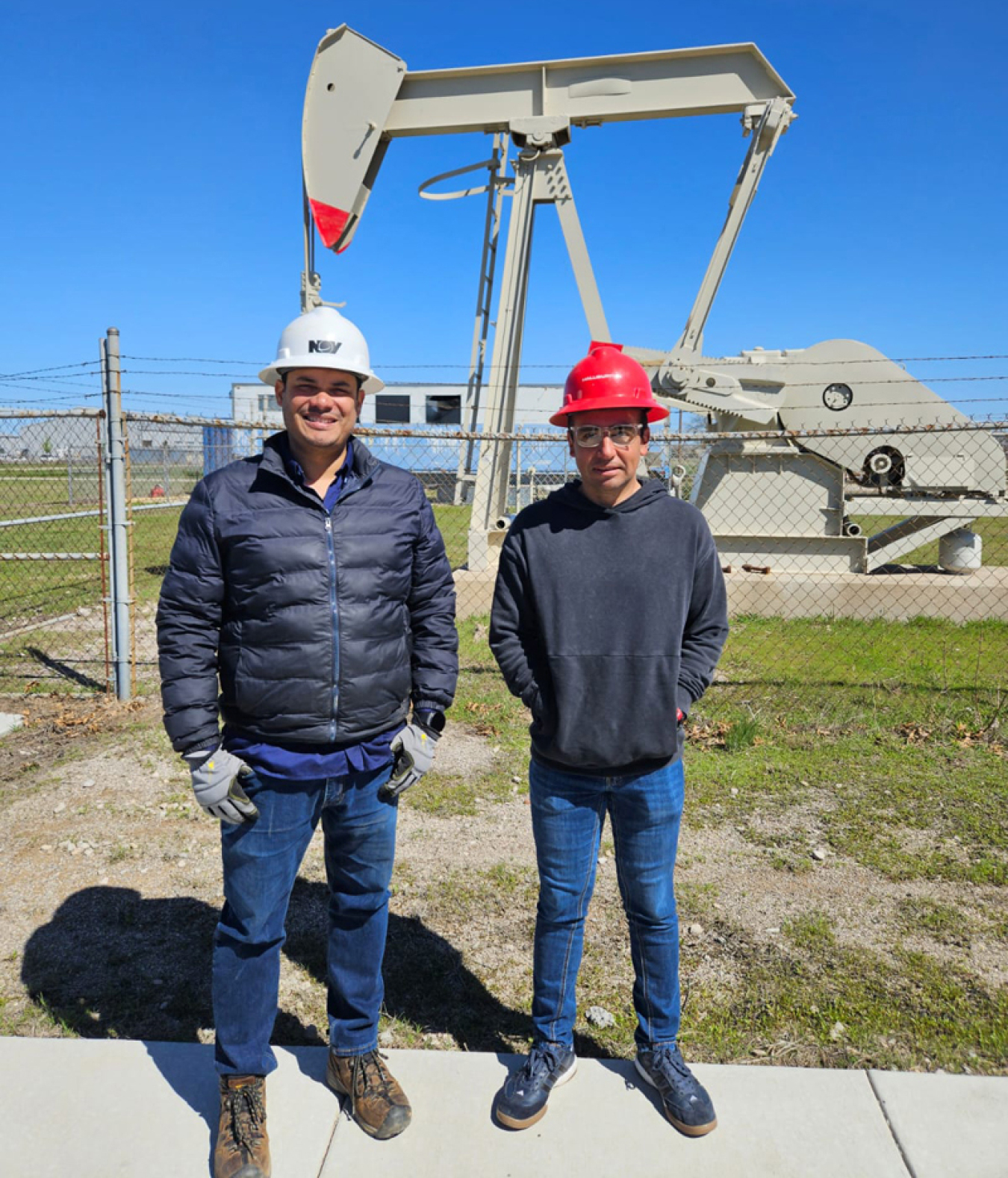
Engineers José Aramendiz (left) and César Vivas (right) stand in front of an oil and gas well located next to the Well Construction Technology Center, one of the OU research centers where various research groups carry out their projects related to oil, gas, and, more recently, geothermal energy.
Enthusiasm for geothermal energy is growing, including among oil and gas workers who are learning how they can apply their skills and experience to geothermal technology. Just ask José Aramendiz and César Vivas, two University of Oklahoma (OU) Ph.D. students whose team just won first place titles in the technical track of the U.S. Department of Energy's (DOE) 2023 Geothermal Collegiate Competition (GCC).
After graduating as a petroleum engineer from the Industrial University of Santander in Colombia, Aramendiz began a 12-year professional journey specialized in drilling and assumed various roles from Drilling Fluids Engineer to Directional Drilling and Operations Optimization. "This experience sparked my interest in orienting my career toward geothermal energy, which led me to OU, where I'm currently pursuing my doctoral studies focused on the area of well construction for geothermal applications."
Vivas was also introduced to geothermal energy in Colombia after years working as a field engineer in oil and gas, specializing in Well Construction Operations. Vivas is now learning more about the "heat beneath our feet" through his doctoral studies. After participating in the GCC, Vivas said, "I was delighted to recognize that the knowledge and experience I gained in more than 10 years in the oil and gas industry could be transferred to the geothermal industry."
The oil and gas industry and the geothermal industry have several similarities, including the process of exploring and accessing energy below the earth's surface. For example, in locations where conventional hydrothermal resources do not exist, enhanced geothermal systems use techniques similar to those in oil and gas to create the right conditions for accessing geothermal energy. As Vivas and Aramendiz learned through the GCC, these commonalities mean that skilled workers in oil and gas can readily apply those skills to geothermal efforts—giving them the chance to be a part of America's expanding energy workforce.
The GCC invites teams from collegiate institutions to develop real-world geothermal solutions while competing for cash prizes and gaining resume experience in the renewable energy industry. For the 2023 competition, Aramendiz, Vivas, and their OU teammates designed a system of geothermal wells to heat and cool the Osage Nation's 40,000-square-foot greenhouse, supporting efforts for native food sovereignty in Pawhuska, Oklahoma.
The next step for the OU team is to host a community event where Aramendiz, Vivas, and their teammates will recognize the community members who contributed to their project and discuss how their winning design can benefit the Osage Nation. "Personally, the GCC helped me understand the important role petroleum engineers play in the development of geothermal energy, but most importantly how geothermal energy can positively impact the life quality of our communities," Aramendiz added.
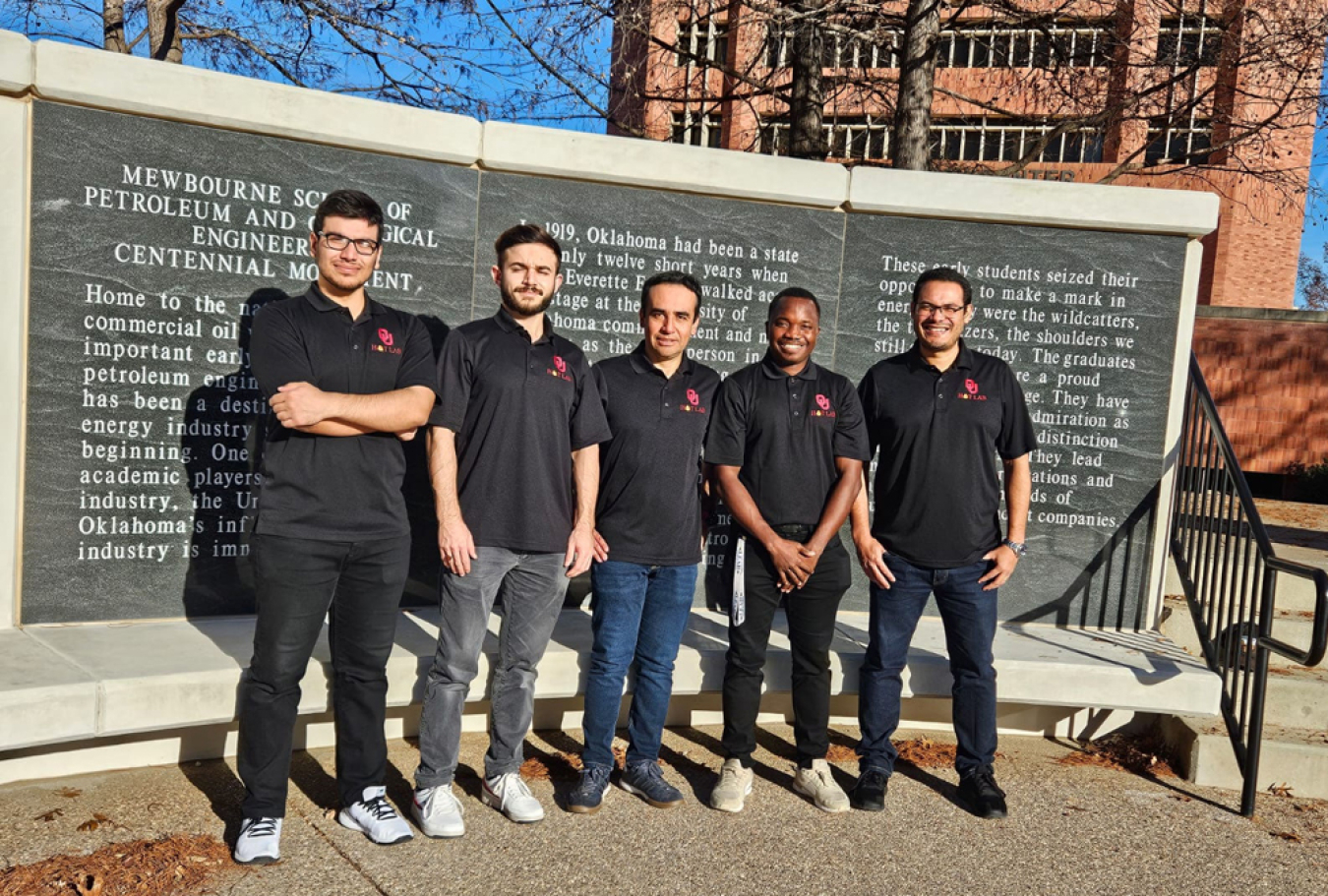
The DOE Geothermal Technologies Office has funded the GCC for more than 10 years, giving students like Aramendiz and Vivas valuable real-world experience working in renewable energy.
EERE prizes and competitions transform ideas for energy innovations into reality. Anyone can apply to win cash prizes and technical support from world-renowned experts. Subscribe to receive GCC updates, or sign up for our Prizes and Competitions newsletter to find a prize or competition that's right for you.
Meet Energy Champions at EERE
-
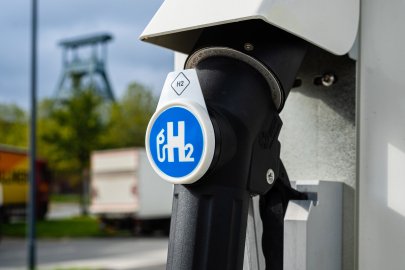 Meet American Energy Innovators Dr. Jennifer Lalli and Courtnay Brand of NanoSonic, Inc. NanoSonic, Inc specializes in the design and manufacture of innovative materials and, with the help of EERE, are driving in the future of hydrogen vehicles.
Meet American Energy Innovators Dr. Jennifer Lalli and Courtnay Brand of NanoSonic, Inc. NanoSonic, Inc specializes in the design and manufacture of innovative materials and, with the help of EERE, are driving in the future of hydrogen vehicles. -
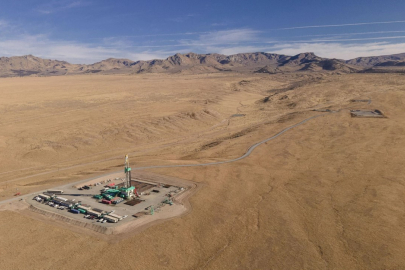 Kevin Jones started his career in the oil and gas industry, but soon found that many of the skills he acquired through his work in oil and gas were transferable to other energy sectors, especially geothermal technologies.
Kevin Jones started his career in the oil and gas industry, but soon found that many of the skills he acquired through his work in oil and gas were transferable to other energy sectors, especially geothermal technologies. -
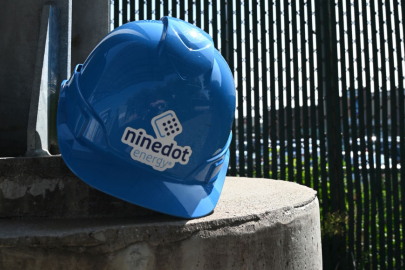 American Energy Innovators David Arfin and Adam Cohen talk about their solar and battery storage company NineDot Energy and the important role EERE played in helping them build the successful business they operate today.
American Energy Innovators David Arfin and Adam Cohen talk about their solar and battery storage company NineDot Energy and the important role EERE played in helping them build the successful business they operate today. -
 Learn how Kristine Moody, a molecular ecologist at Oak Ridge National Laboratory, developed an intense curiosity about aquatic creatures, leading to a career in water power.
Learn how Kristine Moody, a molecular ecologist at Oak Ridge National Laboratory, developed an intense curiosity about aquatic creatures, leading to a career in water power. -
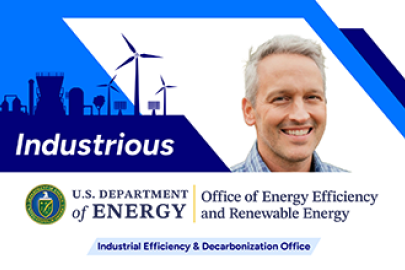 Industrious series: Meet Corey Tyree, who shares in Q&A interview how curiosity led him from a rural town into engineering.
Industrious series: Meet Corey Tyree, who shares in Q&A interview how curiosity led him from a rural town into engineering. -
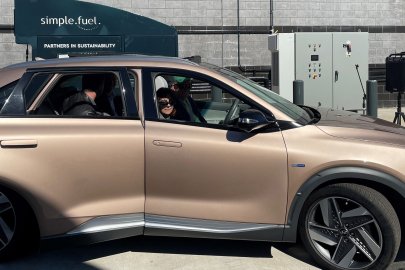 DOE and its partners celebrate the installation of a new hydrogen fueling station at Lincoln Financial Field.
DOE and its partners celebrate the installation of a new hydrogen fueling station at Lincoln Financial Field. -
 Matthew Grosso, Director of the U.S. Department of Energy’s Water Power Technologies Office, shares how his childhood interest in history and inspiration from Abraham Lincoln led him to become a leader in public service.
Matthew Grosso, Director of the U.S. Department of Energy’s Water Power Technologies Office, shares how his childhood interest in history and inspiration from Abraham Lincoln led him to become a leader in public service. -
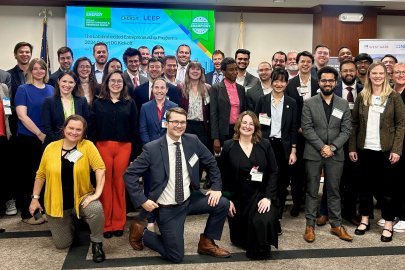 DOE’s Lab-Embedded Entrepreneurship Program (LEEP), managed by AMMTO, welcomed its 2024 cohort to its headquarters in Washington, D.C. to kick off their two-year fellowships
DOE’s Lab-Embedded Entrepreneurship Program (LEEP), managed by AMMTO, welcomed its 2024 cohort to its headquarters in Washington, D.C. to kick off their two-year fellowships -
 Jon-Edward Stokes is Making It! In a Q&A interview, how his shifted his academic focus from English to science and what gives his career purpose.
Jon-Edward Stokes is Making It! In a Q&A interview, how his shifted his academic focus from English to science and what gives his career purpose. -
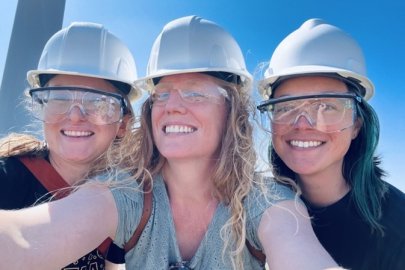 The wind energy workforce is made up of a wide range of people and skills. Learn about the career journey of PNNL lab program manager Alicia Mahon.
The wind energy workforce is made up of a wide range of people and skills. Learn about the career journey of PNNL lab program manager Alicia Mahon.

